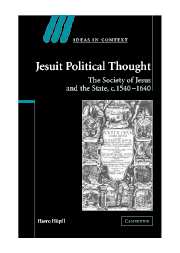Book contents
- Front Matter
- Contents
- Acknowledgements
- List of abbreviations
- Translations, references, and orthography
- Introduction
- 1 The character of the Society of Jesus
- 2 The Society's organisational ideas
- 3 The Society and political matters
- 4 The Church, the Society, and heresy
- 5 The confrontation with reason of state
- 6 Reason of state and religious uniformity
- 7 Jesuit reason of state and fides
- 8 Reason of state, prudence, and the academic curriculum
- 9 The theory of political authority
- 10 Limited government, compacts, and states of nature
- 11 The theory of law
- 12 The common good and individual rights
- 13 Tyrannicide, the Oath of Allegiance controversy, and the assassination of Henri IV
- 14 The papal potestas indirecta
- Conclusion
- Bibliography
- Index
- IDEAS IN CONTEXT
12 - The common good and individual rights
Published online by Cambridge University Press: 22 September 2009
- Front Matter
- Contents
- Acknowledgements
- List of abbreviations
- Translations, references, and orthography
- Introduction
- 1 The character of the Society of Jesus
- 2 The Society's organisational ideas
- 3 The Society and political matters
- 4 The Church, the Society, and heresy
- 5 The confrontation with reason of state
- 6 Reason of state and religious uniformity
- 7 Jesuit reason of state and fides
- 8 Reason of state, prudence, and the academic curriculum
- 9 The theory of political authority
- 10 Limited government, compacts, and states of nature
- 11 The theory of law
- 12 The common good and individual rights
- 13 Tyrannicide, the Oath of Allegiance controversy, and the assassination of Henri IV
- 14 The papal potestas indirecta
- Conclusion
- Bibliography
- Index
- IDEAS IN CONTEXT
Summary
As we have repeatedly seen, it was beyond contention for Jesuits that the end and justification of government, law, and policy was the common good (or the common felicitas, beatitudo, utilitas, all impeccably Aristotelian and Thomist synonyms). All the same, no Jesuit thinker seems to have submitted the concept to separate and sustained investigation. This was no doubt partly at least for the banal reason that ‘what is the common good?’ was not a standard quaestio in the Thomist corpus. The concept had, however, raised perplexing issues for scholastics since at least the thirteenth century. The common good unquestionably had precedence over the individual good; Aristotle had even described it as ‘more divine’. But Augustinians and Thomists alike acknowledged that there was a natural and legitimate self-love and self-preference, and it could not be denied that the two might conflict, at least in appearance. What no Jesuit seems to have been prepared to concede, however, was that there could be genuine conflicts where right was equally on the side of the public and of private individuals. Moreover, there had from medieval times been a not fully articulated tension between two quite different conceptions of the polity, and therefore of the common good: was the polity to be understood as providing merely the background conditions of peace and civility for individual flourishing, or as some kind of common enterprise (a school of virtue, say) to which all subjects must be compulsorily recruited?
- Type
- Chapter
- Information
- Jesuit Political ThoughtThe Society of Jesus and the State, c.1540–1630, pp. 283 - 313Publisher: Cambridge University PressPrint publication year: 2004



